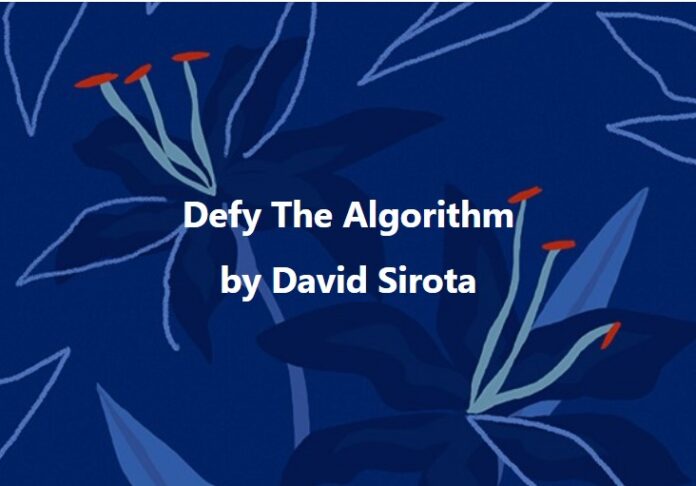(from a Christmas Day subscription pitch for his publication The Lever, but not just your banal ad copy)
~ ~
“Sadly, the algorithms don’t support a Lever business model.”
My good friend said this to me a few days ago, and I haven’t been able to stop thinking about it — because it’s true, and after more than two years building this news organization, there are days when I do wonder if we can overcome The Algorithm.
That term is shorthand for the opaque formulas social media platforms use to preference, throttle, and shadowban content. In practice, though, it’s more than merely a technological invisible hand. It is also a corporate media-driven discourse that has inculcated Americans to assess reporting’s value and shareability based on whether it is seen as helping or hurting the reader’s preferred political party, favorite politician, or news-cycle cause of the day.
This is a brave new world beyond even the warnings of Citizen Kane or 1984, a world in which billionaires, corporations, and the two parties have throngs of adoring fans and discourse enforcers to drown out facts that are inconvenient to those same billionaires, corporations, and political parties.
Social media platforms and corporate media learn from that feedback system, shaping their content preferences to exploit it for ever more clicks, retweets, recommendations, and ratings. Hence, the ascendant business model in media is clicky hot takes about divisive cultural issues, content “presented by” corporations looking to shape public policy outcomes, or quite literally “the newsletter for the mogul set.”
Trapped inside this filter bubble, The Lever has chosen a different path — one that hasn’t really existed, at least not in modern times. We do not report Washington news of, by, and for Washington insiders and wonks — we write for everyone else. We do not deliver partisan talking points — we report things both parties want to keep secret. We do not repackage press releases as news — we interrogate corporate propaganda. And we do not rely on corporations to fund our work — we rely on our readers to fund our journalism.
In short: We scrutinize, question, and challenge corporate power and political corruption — the topics that The Algorithm and its owners loathe. As such, every day for us is an uphill battle not only to do the reporting, but to distribute the revelations so that they can inform the political conversation, prompt action, and make change.
Every now and again, we find a glitch in The Algorithm and our stories travel far, which is how our small outlet has racked up more than 33 million impressions over the last year, and why our own social media and podcast followership continues to grow. And when we find those glitches, we can create leverage and make a real impact — which is the whole point of what we do.
There was Julia Rock’s reporting on student debt cases that prompted a big reversal from the Biden administration. There was Andrew Perez’s reporting that uncovered the largest known dark money donation in American history. There was Matthew Cunningham-Cook’s reporting on railroad executives paying themselves $200 million before they tried to crush their employees. And there was Rebecca Burns’ exposé on Gov. Ron DeSantis’ property insurance industry giveaway in hurricane-ravaged Florida.
But for every story of ours that manages to survive in The Algorithm, others of equal import get trapped in the filter.
There was the story of the Biden administration refusing to end an illegal $50 billion tax loophole that mostly benefits the rich. There were the stories about a Republican congressman and now senator-elect pressuring regulators to let his donors circumvent his own state’s predatory lending laws. There was the story of the world’s largest asset management firm trying to help companies hide their carbon emissions during the climate crisis. And most recently, there were our two reports about Wall Street lobbyists trying to preserve a lawless financial system that routinely fleeces retirees.
These were original, time- and cost-intensive stories about some of the most important issues facing humanity — but they went into a black hole on social media and were completely ignored by a chattering class obsessing over everything except what’s actually important. And as we’ve experienced in a difficult second half of 2022 for The Lever and other subscription-based news outlets, when that happens, the sustainability of our newsroom is jeopardized — fewer people see our stories, fewer people subscribe to our email list, fewer people pitch in to fund our journalism.
Of course, this is a world where Congress keeping 4 million kids in poverty gets quite literally a tiny fraction of the attention as Elon Musk’s antics on Twitter — so I don’t take this problem personally, even if it keeps me up at night.
This is a systemic challenge and, as Hyman Roth says in The Godfather, “this is the business we’ve chosen” — so I’m hardly surprised by the turbulence we face. I knew what I was getting into when I launched The Lever from scratch a little more than two years ago. I knew that every single day would be a slog inside an information echo chamber whose owners and apparatchiks despise me and — more importantly — hate the kind of reporting that our team chooses to do.
In addition, I acknowledge that many of the challenges we face reflect the limitations of our model.
For instance: We put as much of our limited resources as possible into reporting, so we do not have a massive advertising budget of promoted tweets and podcast ads and other sponsored content.
Similarly, because we are not bankrolled by huge corporations, we do not have limitless resources to cover every single story in every news cycle, which means we miss opportunities.
There are also larger societal forces at play. Example: We are a reader-supported news outlet in a country where people are conditioned to spend huge sums on media products like cable TV and movies, but where the idea of pitching in a little bit to support public-interest journalism is not part of the culture.
Meanwhile, we do not have insider media connections to pitch Washington and New York reporters on glowing puff pieces about our unlikely success bootstrapping our way to a small-but-growing newsroom — and without that, we cannot get our own Wikipedia page and until very recently couldn’t even get our original reporting to show up on Google News.
And yet all of those shortcomings aside, our biggest obstacle to building out a more robust independent media outlet is the one my friend articulated: The reporting we do does not have a built-in, ready-to-click audience, because our journalism does not fit neatly into what The Algorithm rewards, and what the red-versus-blue news consumer has been conditioned to consume.
That is a problem not just for The Lever, but for democracy. If a society can only accept and promote reporting that serves a particular party, corporation, politician or cause — and if a social and corporate media machine is effectively suppressing facts that contradict conventional wisdom — then that society probably will not make good, constructive, or humane decisions.
To be sure, some media folks have been arguing that scoops alone generate attention, audience, and revenue in a virtuous cycle of sustainable journalism. The idea is that if you just generate more scoopy stuff, an ever bigger audience is there for the taking. It sounds great, but after decades of journalism, I’ve seen that this axiom only really holds for certain kinds of scoops — namely, scoops that don’t surface truths that are inconvenient to economic power, don’t scramble the red-team/blue-team view of politics, and thus don’t offend The Algorithm.
Facing this challenge, The Lever could change what we do. We could follow others’ path and become an outlet that focuses only on Republicans’ latest outrage of the day, or on boosting Democratic politicians, or on mass producing hot takes and YouTube rants about whatever fake controversy is currently generating clicks in the content mines. The Algorithm has made that a reliably lucrative path for Internet traffic, cable TV news bookings, and subscribership.
But at age 47, I find myself more and more aware of how finite time is. I refuse to spend whatever time I have left on this planet worshiping The Algorithm that is distracting this country from its fixable problems, and worse, intensifying so many of the existential crises imperiling our world. The Lever has made it this far against the odds, growing our audience, expanding our newsroom amid mass media layoffs, and breaking big stories every year. And so we’re not going to change.
In 2023, we will continue following the money, exposing the corruption, and reporting the unreported stories. Whether our content is suppressed by social media or ignored by corporate media, we know we will be competing on an uneven playing field. But as long as enough subscribers continue pitching in to fund our newsroom, we will keep holding the powerful accountable, even if The Algorithm is designed to silence us.
~ ~
Help us spread the word! Please forward this email to family and friends.
Was this email forwarded to you? Sign up for free to receive original reporting like this in your inbox every day.
Contact The Panama News by email at fund4thepanamanews@gmail.com
To fend off hackers, organized trolls and other online vandalism, our website comments feature is switched off. Instead, come to our Facebook page to join in the discussion.
These links are interactive — click on the boxes









